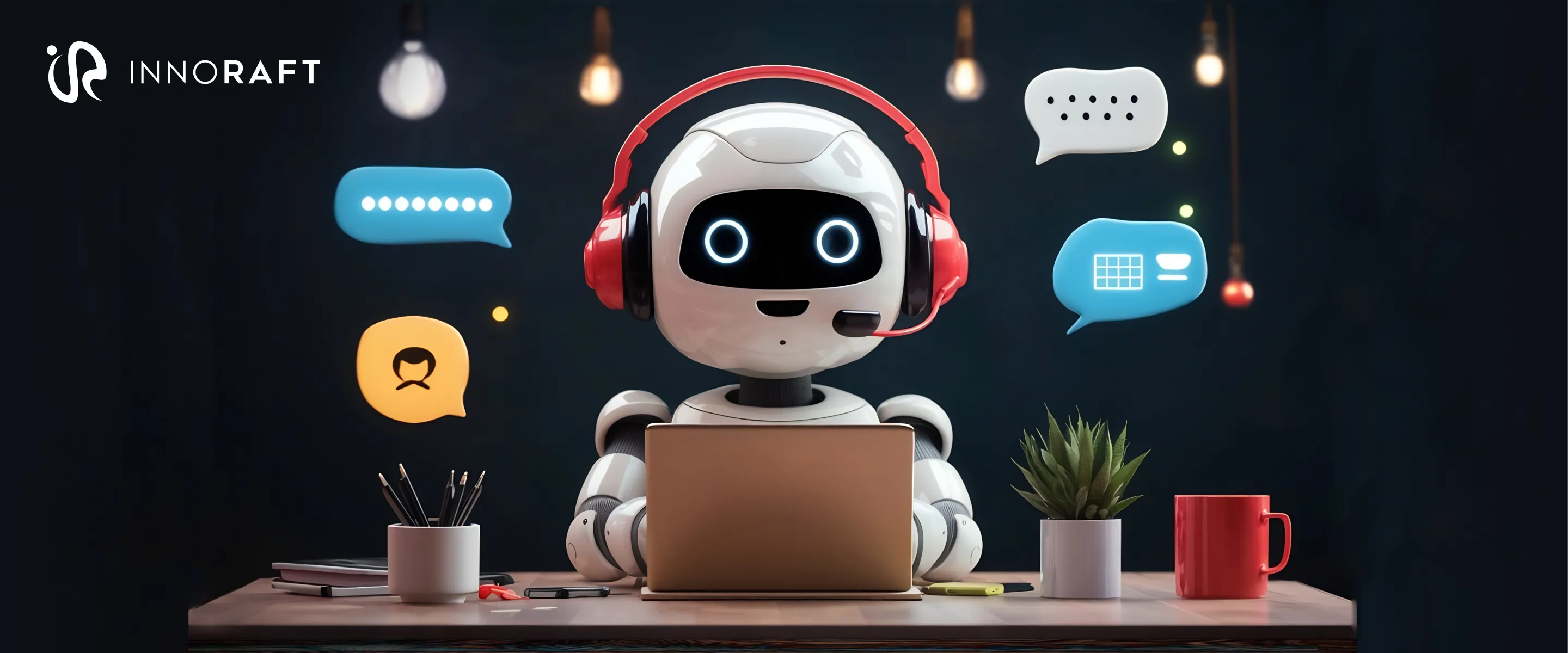Customer experience- the competitive battleground where brands win or lose. But what happens when the rules of the battle change entirely thanks to the evolving technology?
Artificial intelligence (AI) continues to expand its influence across business functions, and customer service is one of the areas feeling that shift most intensely. According to one study, 83% of respondents plan to adopt AI tools to speed up response times, sort queries automatically, and support their teams with insights that were previously impossible to generate manually.
So here's the real question: If AI in customer service can transform it so effectively, what should be the long-term goal for your business? The answer is not full automation. The real value appears when AI enhances human capabilities and creates a support system where speed, efficiency, and empathy coexist. This blended approach is what strengthens customer relationships while also improving business performance.
AI in Customer Service: What It Means and What Drives It?
The modern customers want quick, seamless, and personalized support across all digital channels. But fulfilling this extensive requirement might get difficult for human agents, and the customers no longer have the time for mistakes in manual customer service operations. This intersection between customer expectations and customer service agent capability is where the real value of AI customer experience solutions emerges.
AI strengthens customer service by taking over routine, repetitive work, the kind that doesn’t need human judgment. This means customers receive quicker answers to straightforward questions. More importantly, it frees your support team to focus on complex situations where empathy, reasoning, and personalization actually make a difference. Instead of creating a conflict between AI and human capability, it creates space for both to excel where they’re needed most.
Artificial intelligence in customer support is not just one single technology, however. It is a bundle of different technologies, acting as the foundational pillars, that enable AI customer service solutions to offer a fast and tailored experience to each customer. These technologies are:
Natural Language Processing (NLP) and Natural Language Understanding (NLU)
These systems help machines intuitively interpret customer queries, NLP analyzes language structure, while NLU understands meaning and intent. Together, they allow a virtual agent to interpret customer requests in a natural conversation.
Machine Learning
Machine learning in customer support improves repeated interactions. The more data they receive, the more accurate their predictions and suggestions become. This makes it easier to recognize patterns in customer issues, anticipate needs, and recommend solutions.
Chatbots and virtual assistants
AI chatbots for customer service handle simple questions, guide users through standard processes, and respond instantly around the clock. They work well for requests that do not require human nuance.
Intelligent IVR
IVR systems have evolved from rigid menu selections to voice-driven experiences that can understand spoken requests and direct customers more intelligently.
AI in Customer Service Use Cases
AI customer experience solutions are used to automate simple tasks, guide agents, offer personalized experiences, and improve the operational efficiency of customer service operations. Let's take a more detailed look at these use cases to understand how AI is changing the way customer service functions:
Conversational AI
Conversational AI is the broader term that encompasses AI-driven communication technologies like AI chatbots for customer service, AI agents, and virtual assistants. Interactions provided by conversational AI are not just powered by decision trees and if/then statements. Conversational AI use cases for customer support leverage NLP and ML to provide human-like interactions to the customers. These conversational AI assistants and bots are designed to understand, process, and respond to customer queries in a meaningful manner, ranging from answering simple questions to guiding customers through more complex customer service journeys.
24/7 Self-Service
Thanks to its convenience, speed, and availability, 24/7 self-service has become popular among customers. In the customer service context, it provides a sense of autonomy, allowing customers to seek out and solve their problems without any hitches, increasing satisfaction.
Though you can implement self-service through detailed FAQs or blogs about your products/services, AI can help you enhance this capability further. With AI implemented in self-service, customers can easily find the information and resources without having to spend a lot of time searching. Additionally, with the right customer service automation tools embedded in a customer support helpdesk, you can leverage the company's historical data, including past tickets, internal company documentations, and external knowledge bases, to compile information more efficiently and help customers access the comprehensive information base designed for them, and get the information without agent interference.
Automate Repetitive Tasks
Customer service operations come with numerous repetitive tasks, such as standard email and chat replies, ticket and case management, feedback collection, data entry, appointment scheduling, etc. While these tasks are crucial to maintain a smooth customer service workflow, they can take up too much time for human agents, indirectly affecting their capacity to attend to the customers and resolve their queries and challenges. Automating these tasks with the help of AI-powered customer support agents can significantly enhance customer support by reducing response times and operational costs. Integrating AI to automate these tasks also frees up the human agents, empowering them to shift their focus to more strategic support initiatives and offer a more proactive and human experience to the customers who need them.
What are the Benefits and Challenges of AI in Customer Service?
AI customer experience solutions deliver significant advantages, but it also creates challenges that require thoughtful implementation. Understanding both sides helps organizations design AI-powered customer experience systems that are effective, ethical, and customer-friendly.
A. What Benefits Does AI Offer for Businesses?
The benefits of AI in customer service are many, and we can divide them into three broader categories.
Benefit 1: A Radically Better Customer Experience
There's no denying that implementing AI within customer service workflows can radically improve the overall customer experience with the brand. With an AI-driven support process, you can offer a plethora of benefits to the customers, including 24/7 availability, proactive and consistent support across all digital channels, and faster response times. Additionally, AI implementation also improves the customer data collection and management process, which leads to better customer insights and personalization.
Benefit 2: Increased Operational Efficiency and Cost Control
The impact of AI-powered customer support operations is evident in the way it allows businesses to handle a large volume of customer requests simultaneously, streamline operations without needing to hire huge support teams, and make it easier to grow without sacrificing scalability. Additionally, AI automation can also lower costs by reducing reliance on extra staff for routine inquiries and repetitive tasks, as well as recognizing manual mistakes, identifying coaching opportunities for agents, flagging conversations that need to be revisited, and continuously refining service quality.
Benefit 3: An Effective and More Empowered Team
Besides improving customer experience and operational efficiency, AI integration also has a significant impact on the agents. Customer service automation tools empower them to focus on more complex or sensitive support issues that require a more human response and support. Aside from this fact, AI can also provide agents with real-time insights and suggest next steps during live conversations, enhancing the communication between agents and customers.
B. What Challenges Limit AI in Customer Service?
AI brings remarkable efficiencies to customer service, but it also introduces challenges that organizations can’t afford to overlook. Understanding these limitations is essential for building a balanced, human-centered AI strategy that strengthens, rather than disrupts, your service operations.
Challenge 1: Implementation and Technical Hurdles
Integrating advanced AI customer experience solutions into an existing customer service workflow demands more than just a simple plug-and-play approach. It requires an evolving technology stack that's also supported by reliable data pipelines, robust analytics, cloud infrastructure, and ongoing technical expertise.
The real challenge, however, lies in ensuring that all these components work together seamlessly. Without careful planning, AI adoption can complicate the tech ecosystem and create operational friction. Effective change management becomes crucial here- businesses need clear strategic direction, involvement from key stakeholders, and iterative testing to avoid disruptions. Without this structured approach, the potential for innovation and competitive advantage remains underused.
Challenge 2: Risks to the Customer Experience
AI can speed up responses and personalize interactions, but it still struggles with emotional intelligence. Customers, when dealing with complex or sensitive challenges during their user journey, expect empathy, flexibility, and an understanding of context from their customer service agent. However, despite being trained on vast data sets, AI cannot ideate a unique solution, nor can it replicate the human touch during these complex customer service cases.
Over-automation can be highly frustrating to users when customer service automation tools fail to interpret nuances, offer rigid solutions, or miss the intent behind a query entirely. And because AI isn't naturally equipped to handle unanticipated situations, customers may feel unheard when their issues fall outside the system's predefined patterns. When this happens, the technology meant to enhance customer experience can inadvertently undermine it.
Challenge 3: New Risks: Data, Ethics, and Security
AI systems operate on vast amounts of data, which brings a new set of responsibilities and risks. Issues like biased algorithms, data privacy concerns, or unintended errors can impact customer trust and brand reputation.
As organizations rely more heavily on AI-driven insights, ensuring ethical use of data, maintaining transparency, and protecting sensitive information become non-negotiable. Without strong governance frameworks, AI can introduce vulnerabilities that might outweigh benefits.
The Bottom Line: Balancing The Human and AI Collaboration in Customer Service
There's no denying that AI brings tremendous potential to customer service operations, from automated support to enhanced agent performance. It helps customers get faster resolutions and allows businesses to scale without compromising quality. When used responsibly, it becomes a strategic asset that improves both internal operations and the overall customer journey. However, there's a catch- You cannot replace the human touch with AI, especially in customer service. Artificial intelligence in customer support can offer faster solutions and help manage repetitive operations, but it cannot replicate human understanding, empathy, and flexibility.
The future of AI in customer service depends on this balance- an AI-driven, human-centric customer service that focuses on making the process faster, more efficient, flexible, empathetic, and better for all stakeholders involved.
Key takeaways:
- AI enhances customer service by automating simple tasks and assisting human agents.
- NLP, ML, chatbots, and intelligent IVR systems work together to deliver faster, personalized responses.
- AI improves efficiency through intelligent routing, sentiment analysis, and workflow automation.
- Customers benefit from quick answers and smoother self-service options.
- Challenges include a lack of emotional intelligence, integration complexity, and data privacy concerns.
- The real value appears when AI and human agents work together, combining speed with empathy.
Want to start integrating AI in your customer service workflow? Contact our experts today to get started!
FAQ
Frequently Asked Questions
Didn’t find what you were looking for here?

